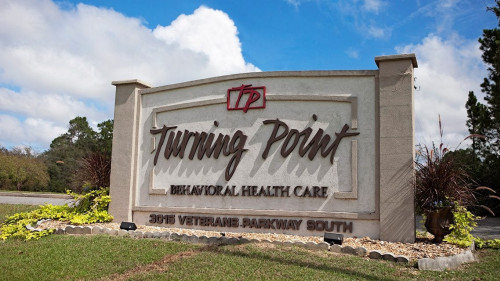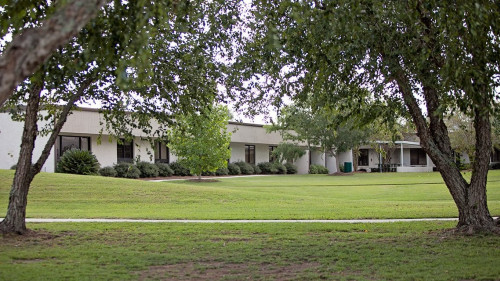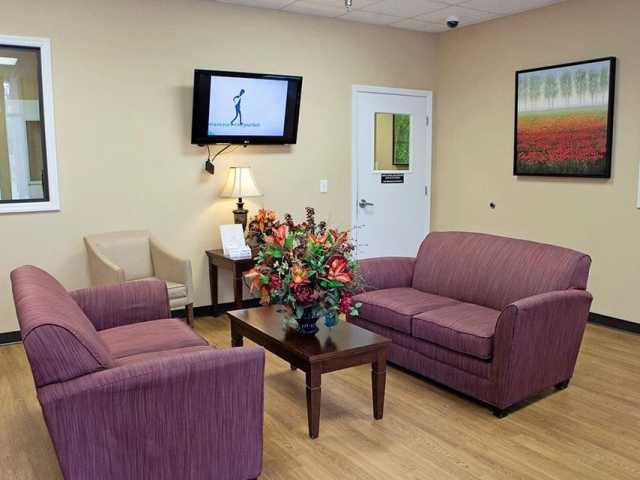








Turning Point Care Center
Verified Center
This provider's information has been quality-checked by Recovery.com's Research Team for accuracy and completeness, including center verification through appropriate third-party organizations.
Treatment Focus
This center treats substance use disorders and mental health conditions. You'll receive individualized care catered to your unique situation and diagnosis, learn practical skills for recovery, and make new connections in a restorative environment.
Primary Level of Care
Offering intensive care with 24/7 monitoring, residential treatment is typically 30 days and can cover multiple levels of care. Length can range from 14 to 90 days typically.
Treatment Focus
This center treats substance use disorders and mental health conditions. You'll receive individualized care catered to your unique situation and diagnosis, learn practical skills for recovery, and make new connections in a restorative environment.
Primary Level of Care
Offering intensive care with 24/7 monitoring, residential treatment is typically 30 days and can cover multiple levels of care. Length can range from 14 to 90 days typically.
Provider's Policy
Turning Point accepts Medicare and most commercial insurances.
Turning Point Care Center
Turning Point Care Center
About Turning Point Care Center
Turning Point Care Center offers hope and healing for adults struggling with chemical dependency, mental health challenges, or a mix of both. From inpatient psychiatric care to outpatient therapy, they provide a full spectrum of treatment options that can be precisely customized to each individual’s personality, history, and concerns. The quiet, rural setting in south Georgia creates a conducive backdrop for a recovery journey. Turning Point supports individuals every step of the way by treating walk-ins, offering 24/7 assessments and referrals, hiring compassionate staff, and providing innovative programs like virtual outpatient therapy. Clients can take the first step towards a brighter tomorrow through treatment at Turning Point.
Heal Mind, Body, and Spirit
At Turning Point Care Center, the focus is on nurturing the whole person by blending traditional and innovative approaches to healing. Their expert team goes beyond standard treatment by integrating evidence-based therapies like cognitive behavioral therapy (CBT) and dialectical behavior therapy (DBT) with emotionally-soothing practices such as art therapy and mindfulness exercises. This dynamic combination not only addresses the symptoms of addiction but also encourages personal growth and emotional resilience. With a compassionate staff available 24/7, clients receive attention and support in a welcoming environment with a community of peers healing alongside them.
Tailored Healing for All
Whether someone is a young adult finding their way or a seasoned professional seeking discreet care, the programs at Turning Point cater to diverse needs and age ranges. Clients can immerse themselves in holistic therapies, where traditional treatment meets innovative healing practices. Their programs include art therapy, recreational activities, and yoga, providing creative and physical outlets that promote healing and self-discovery. These therapies complement evidence-based practices, creating a balanced treatment plan that nurtures the mind, body, and spirit.
Their standout virtual outpatient program brings expert care right into clients' living rooms, ensuring that recovery fits seamlessly into their busy lives.
Find Peace and Comfort at Turning Point
The serene environment at Turning Point is designed to support individuals on their recovery journey. Clients reside in semi-private rooms, each furnished with twin beds, spacious wardrobes, and desks to ensure comfort and personal space. The center features inviting common areas, including a TV-equipped lounge, dining room, and therapy rooms, fostering a sense of community and relaxation. Three cafeteria-style meals are provided daily, with accommodations for specific dietary needs. Set on 30 picturesque acres, the center’s grounds have lush flower beds and a tranquil duck pond, creating a peaceful atmosphere for healing.

Highlights from the Center
Highlights
These highlights are provided by and paid for by the center.
Customized Treatment Plans
Certified Professionals
Addiction Recovery
Trauma Treatment
Center Overview
Treatment Focus
This center treats substance use disorders and mental health conditions. You'll receive individualized care catered to your unique situation and diagnosis, learn practical skills for recovery, and make new connections in a restorative environment.
Joint Commission Accredited
The Joint Commission accreditation is a voluntary, objective process that evaluates and accredits healthcare organizations (like treatment centers) based on performance standards designed to improve quality and safety for patients. To be accredited means the treatment center has been found to meet the Commission's standards for quality and safety in patient care.

Turning Point Care Center
Insurance Accepted




Recovery.com Verified Listing
Recovery.com verified that the name, location, contact information and license to operate for this treatment provider are valid and up-to-date.

Joint Commission Accredited

Licensed by Georgia
Recovery.com is an independent, third-party mental health resource. Verification does not imply endorsement and does not guarantee the quality of treatment services.
Meet Your Care Team

Heather Fuller
CEO

Peggy Yates
Clinical Director

Joseph Dean
Director of Nursing

Dr. Muhammad Mahmood Alam
Medical Director, Psychiatrist
Your Care Options
Specializations
Personality Disorders
Personality disorders destabilize the way a person thinks, feels, and behaves. If untreated, they can undermine relationships and lead to severe distress.
Alcohol
Using alcohol as a coping mechanism, or drinking excessively throughout the week, signals an alcohol use disorder.
Bipolar
This mental health condition is characterized by extreme mood swings between depression, mania, and remission.
Depression
Symptoms of depression may include fatigue, a sense of numbness, and loss of interest in activities. This condition can range from mild to severe.
Drug Addiction
Drug addiction is the excessive and repetitive use of substances, despite harmful consequences to a person's life, health, and relationships.
Medicare
A simple coverage option for Americans without health insurance and disabilities. Many private insurances incorporate Medicare to expand its coverage options.
Residential
In a residential rehab program, patients live onsite, with access to daily treatment and 24-hour care. An average stay is 30-90 days.
Trauma
Some traumatic events are so disturbing that they cause long-term mental health problems. Those ongoing issues can also be referred to as "trauma."
Who We Treat
Men and Women
Men and women attend treatment for addiction in a co-ed setting, going to therapy groups together to share experiences, struggles, and successes.
Treatment Services
Day Treatment
In a PHP, patients live at home but follow an intensive schedule of treatment. Most programs require you to be on-site for about 40 hours per week.
Detox
Detox fully and safely removes toxic substances from the body, allowing the next steps in treatment to begin with a clean slate.
Intensive Family Program
Some rehabs offer intensive programs for loved ones. Group and individual therapy sessions help everyone heal, and improve family dynamics.
Intensive Outpatient Program
In an IOP, patients live at home or a sober living, but attend treatment typically 9-15 hours a week. Most programs include talk therapy, support groups, and other methods.
Licensed Primary Mental Health
Some primary care providers offer mental health diagnosis and treatment. This can prevent patients from developing more serious conditions.
Outpatient
During outpatient rehab, patients attend a structured treatment program while continuing to live at home.
Residential
In a residential rehab program, patients live onsite, with access to daily treatment and 24-hour care. An average stay is 30-90 days.
Approaches
Evidence-Based
A combination of scientifically rooted therapies and treatments make up evidence-based care, defined by their measured and proven results.
Individual Treatment
Individual care meets the needs of each patient, using personalized treatment to provide them the most relevant care and greatest chance of success.
Twelve Step
Incorporating spirituality, community, and responsibility, 12-Step philosophies prioritize the guidance of a Higher Power and a continuation of 12-Step practices.
Therapies
1-on-1 Counseling
Patient and therapist meet 1-on-1 to work through difficult emotions and behavioral challenges in a personal, private setting.
Family Therapy
Family therapy addresses group dynamics within a family system, with a focus on improving communication and interrupting unhealthy relationship patterns.
Relapse Prevention Counseling
Relapse prevention counselors teach patients to recognize the signs of relapse and reduce their risk.
Twelve Step Facilitation
12-Step groups offer a framework for addiction recovery. Members commit to a higher power, recognize their issues, and support each other in the healing process.
Conditions We Treat
Schizophrenia
Schizophrenia is a serious mental health condition that causes hallucinations, delusions, and disordered thinking.
Grief and Loss
Grief is a natural reaction to loss, but severe grief can interfere with your ability to function. You can get treatment for this condition.
Personality Disorders
Personality disorders destabilize the way a person thinks, feels, and behaves. If untreated, they can undermine relationships and lead to severe distress.
ADHD, ADD
ADHD is a common mental health condition caused by dopamine imbalance. Common symptoms include inattention, hyperactivitiy, and impulsivity.
Anger
Although anger itself isn't a disorder, it can get out of hand. If this feeling interferes with your relationships and daily functioning, treatment can help.
Anxiety
Anxiety is a common mental health condition that can include excessive worry, panic attacks, physical tension, and increased blood pressure.
Bipolar
This mental health condition is characterized by extreme mood swings between depression, mania, and remission.
Codependency
Codependency is a pattern of emotional dependence and controlling behavior. It's most common among people with addicted loved ones.
Depression
Symptoms of depression may include fatigue, a sense of numbness, and loss of interest in activities. This condition can range from mild to severe.
Substances We Treat
Alcohol
Using alcohol as a coping mechanism, or drinking excessively throughout the week, signals an alcohol use disorder.
Benzodiazepines
Benzodiazepines are prescribed to treat anxiety and sleep issues. They are highly habit forming, and their abuse can cause mood changes and poor judgement.
Co-Occurring Disorders
A person with multiple mental health diagnoses, such as addiction and depression, has co-occurring disorders also called dual diagnosis.
Cocaine
Cocaine is a stimulant with euphoric effects. Agitation, muscle ticks, psychosis, and heart issues are common symptoms of cocaine abuse.
Drug Addiction
Drug addiction is the excessive and repetitive use of substances, despite harmful consequences to a person's life, health, and relationships.
Heroin
Heroin is a highly addictive and illegal opioid. It can cause insomnia, collapsed veins, heart issues, and additional mental health issues.
Methamphetamine
Methamphetamine, or meth, increases energy, agitation, and paranoia. Long-term use can result in severe physical and mental health issues.
Opioids
Opioids produce pain-relief and euphoria, which can lead to addiction. This class of drugs includes prescribed medication and the illegal drug heroin.
Languages
Aftercare
Care Designed for Your Needs
Personal Amenities
Amenities
Special Considerations
Activities

Learn More About the Center
Tips for Self-Care
Discover how simple yet effective self-care practices can transform mental health.
Effects of Substance Use on Relationships
Discover how substance abuse can profoundly impact trust, communication, and family dynamics.
Understanding Trauma
Discover how trauma-informed therapy can empower individuals to reclaim control over their lives.
Benefits of Gender-Specific Care
Discover how tailored, gender-specific treatment programs can significantly enhance recovery outcomes.
What people are saying
Treatment
3.2
Accommodations
2.7
Food & Nutrition
2.7
Value
3.4
None to give
Reviewed 05/04/25
Review from Rehabs.com
Lisa
Reviewed 02/13/23
Review from Rehabs.com
Kathleen
Reviewed 03/21/23
Review from Rehabs.com
Andrew B
Reviewed 03/02/21
Review from Rehabs.com
Marie
Reviewed 02/28/25
Review from Rehabs.com





